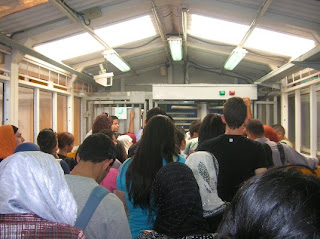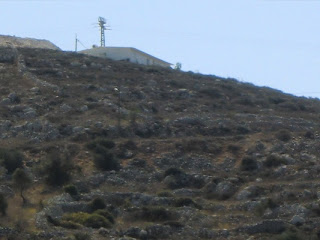Dagen startet veldig bra. Urinveisinfeksjonen jeg har stridt med i et par uker snart, var endelig på retur etter "hestekuren" jeg fikk av legen i nabolandsbyen.
Jeg syns jeg fikk mye gjort; lagde avtaler med kontaktpersoner i de omkringliggende landsbyene som er "mine", skrev ned tanker til blogginnlegg og gjorde forberedelser til delegasjonen som kommer på besøk på lørdag.
Så blusset infeksjonen opp igjen - veldig akutt. Jeg bestemte meg for å reise til Jerusalem for å ta en ny prøve og få denne kultivert. Utfordringen nå ble jo selvfølgelig - hvordan skal jeg klare å reise helt til Jerusalem uten vannlatingsmuligheter?
Denne gangen kostet jeg på meg drosje til
Qalandia. Turen gikk fint - unnagjort på ca. 50 minutter. Kjente på smertene og toalettbehovet, men ikke presserende - ennå.
Det var først da jeg kom inn på Qalandia-terminalen at jeg fikk problemer - og da ikke bare med smertene. Qalandia er et forferdelig sted!! En militær kontrollpost som må passeres dersom man kommer fra Ramallah og skal inn i Jerusalem.
 |
| Kø foran svingdørene |
Jeg syns det var veldig problematisk å stå i kø der i 25 minutter - bli behandlet som kveg - siles gjennom sprinkelsvingdørene der det er såvidt plass til at en person kan passere av gangen - bagasjesjekk og fremvisning av bildeside og visumside i passet til en meget ung kvinnelig soldat som satt bak (skuddsikkert?) glass. Hennes kollega satt ved siden av med bena på bordet og lua trukket ned over øynene og sov. En særdeles klaustrofobisk og nedverdigende opplevelse.
Jeg betraktet de andre i køen, det var en kvinne med en baby som ikke kunne være mer enn 3 - 4 uker gammel, det var studenter og - ja, vanlige folk. De var rolige og stille - dette er nok en rutine de er vant med og må finne seg i.
 |
| Svingdørene er trange og det er så vidt plass til at en person kan passere |
 |
| Tålmodighet er en dyd.... |
Mine 25 minutter var ubehagelige for meg - og jeg er mektig imponert over den tålmodigheten og mentale styrken til de palestinerne som har sitt daglige arbeid i Jerusalem og som må stille seg i kø kl. 4 om morgenen for å ha mulighet til å rekke jobben til kl. 8. At de holder ut!!
 |
| Og folk er virkelig tålmodige! |
Det var deilig å komme ut på andre siden og inn i bussen som skulle ta meg det siste stykket inn til Jerusalem. Bussen var stappfull av unge og eldre palestinere og meg, men ingen knuffing og høye stemmer - jeg fikk snarere en god og trygg følelse av å bli tatt vare på - at folk tok hensyn til og vare på hverandre. Rørende..
Et godt stykke av veien inn mot byen kjørte bussen parallelt med nylagte trikkeskinner som snart skal frakte israelske bosettere i hypermoderne trikker inn til Jerusalem. Palestinere vil ikke få adgang til dette transportmiddelet. Surrealistisk!
Infeksjonen? Vel, den var egentlig ikke det viktigste her, men jeg er mye bedre etter å ha fått en velrettet dose med antibiotika.
 |
| Qalandia |










































